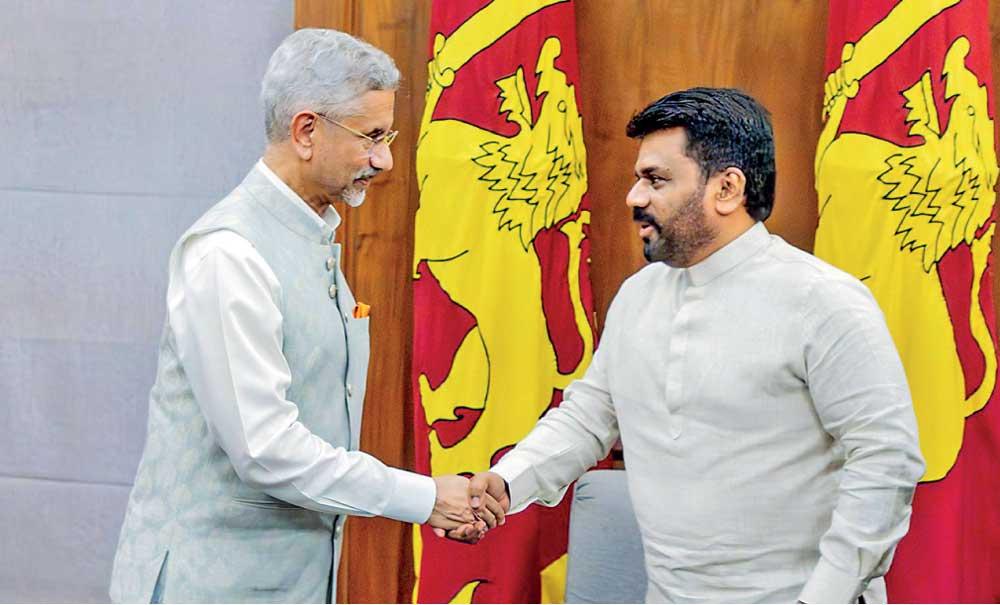Reply To:
Name - Reply Comment

President Anura Kumara Dissanayake, in his meeting with Indian External Affairs Minister (EAM) Dr. S. Jaishankar, said that India’s economic support is critical to realise his vision of a prosperous Sri Lanka and meeting the aspirations of the people, according to a statement released by the Indian External Affairs Ministry after the visit.
The Ministry said the Sri Lankan President referred to the potential of export of renewable energy to India, which could help reduce production costs in Sri Lanka and create additional resources.
The President also noted the contribution of Indian tourists and recognised that this has the potential to grow further.
The President reiterated that Sri Lankan territory would never allowed to be used in a manner inimical to India’s security interests.
Dr. Jaishankar also met with Prime Minister Dr. Harini Amarasuriya and held discussions with Foreign Minister Vijitha Herath. He also met former President Ranil Wickremesinghe and Leader of Samagi Jana Balawegaya (SJB) Sajith Premadasa.
In his discussions with Foreign Minister Herath, he conveyed India’s strong commitment to advance bilateral cooperation based on its ‘Neighbourhood First’ policy and SAGAR outlook. In this context, he assured that India’s ongoing development assistance to Sri Lanka through projects of Sri Lankan priority will be continued. He emphasised that India has offered to modernize the Kankesanthurai Port through a grant to the tune of USD $ 61.5 million. He also conveyed that payments for seven completed Line of Credit projects to the tune of US $ 20 million could be converted into grants. India has also decided to gift 22 diesel locomotives to the Sri Lankan Railways.
In his meeting with the President, EAM spoke about ongoing initiatives in the field of energy production and transmission, fuel and LNG supply, solar electrification of religious places, connectivity, digital public infrastructure, health and dairy development. He highlighted that they would contribute to economic sustainability and provide new streams of revenue. The Sri Lankan President said that India’s economic support is critical to realise his vision of a prosperous Sri Lanka and meeting the aspirations of the people. He referred to the potential of the export of renewable energy to India, which could help reduce production costs in Sri Lanka and create additional resources. The President also noted the contribution of Indian tourists and recognised that this has the potential to grow further.
His conversation with the leadership also covered facilitating Indian investments and job creation in Sri Lanka, as well as expanding the flow of Indian tourists. In his meeting with Prime Minister Amarasuriya, he underlined that the Government of India was prepared to respond to the training and capacity-building requirements of Sri Lanka.
Their discussion also focused on the benefits of digital public infrastructure.
On Sri Lanka’s debt restructuring efforts, he recalled that India had been supportive of Sri Lanka’s economic stability and recovery from the very start. It was the first country to give financing assurances, which enabled the IMF to finalise the Extended Fund Facility. He confirmed India’s support in the Official Creditors’ Committee in respect of Sri Lanka’s agreement with International Sovereign Bondholders. India is also willing to expedite the conclusion of its bilateral MoU with Sri Lanka. The President conveyed his appreciation in that regard.
Regarding security and defence, the meetings brought out that the interests of India and Sri Lanka were closely intertwined. Their collaboration was in mutual interest and contributed to the stability and security of the region. The importance of a continuous dialogue that would promote trust, transparency and mutual sensitivity was recognised.
He raised the concerns pertaining to Indian fishermen who are detained in Sri Lanka. He pressed for their early release, as well as of their boats, and reconsideration of the heavy fines imposed on them. A humanitarian approach focused on livelihood issues would create a durable basis for addressing this matter. A meeting of the Joint Working Group on Fisheries and of the Fishermen Associations would be timely. He appreciated the release of 50 Indian fishermen today.
With regard to the ethnic issue and the reconciliation process, EAM reiterated India’s support for the aspirations of all communities, including Tamils, for equality, justice, dignity, and peace while maintaining the unity, territorial integrity and sovereignty of Sri Lanka. The full and effective implementation of the 13th Amendment of its Constitution and the early holding of Provincial Council Elections will facilitate these objectives.